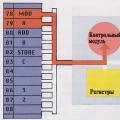Today, the Internet combines a lot of different information. At the same time, there is a need to use foreign resources as sources of information. Not every user has certain knowledge in the field of foreign languages to work with such sources. But, nevertheless, for a comfortable study of sites, special extensions appeared that are installed directly into the browser. Thanks to this, you do not need to download bulky applications to your computer and you can very easily translate the page into Russian.
Translation in Yandex browser
First, let's talk about the website translator built into Yandex. Users do not need to use third-party services. One of his advantages is support for most languages.
How to translate
Yandex Browser offers several options using an internal translator.
To translate a page on a Yandex site into Russian, do the following:

In some cases, the browser cannot offer auto-translation, for example, when the information on the site is only half in a foreign language.
If automatic translation does not work:

Recently an update has been released for Yandex.Translator, it has a new analytical algorithm based on neural networks. Now he is able to perform translation much faster and more accurately. Neural networks were able to teach the browser to determine type of posted texts.
Settings
If the pages are not translated for some reason, then in this case it is necessary use the settings to enable the desired option:

System of translation of words and phrases
This system is hybrid and combines new technologies and old ones. This was done primarily due to the fact that the translation could not always be made readable. The principle of operation is quite simple. User highlights a word or phrase and then sends it for translation. Neural and statistical modules analyze the text, building it into the correct structure. Then the result is presented to the user.
The translation of phrases looks like this:

In order to enable or disable the translator in Yandex, you must perform a number of steps:

Translator in Google Chrome
Google chrome Is one of the most functional browsers today. With its help you can view foreign content without having any knowledge. The built-in translator will come to the rescue, which will quickly carry out the editing of the text.
Working with the service
The process is quite simple:

Settings
In order to enable the translation of pages in Google Chrome, you must do the following:

When activating the function, if the user visits sites containing text information written in a foreign language, the observer will suggest translate the page automatically. 
Translation in Mozilla Firefox
V Mozilla browser Firefox does not have a built-in translator module, so to translate a page in Mozile into Russian, you need to use a third-party extension.
Supplement S3 Translator
One of the more popular page translators for Firefox is the S3 add-on. To download it, you need to go to the Firefox add-on store. After the software has been installed, you need to restart the browser.
How to use:

Working with fragments looks like this:
- on the website, select the required piece of text or word;
- click on the selection with the right mouse button, select the item " Translate selection". An area will appear at the bottom of the screen where the result will be displayed.
ImTranlator extension
A small but functional add-on for Firefox that will translate text into 90 languages. At the same time, the user can flexibly customize it to suit his needs, since the range of functions is very wide.
- download and install extension;
- after installation it is required restart browser;
- v open window browser next to the search bar a button will appear"ImTranslator";
- go to the desired website and select the text;
- click on the translator button, in context menu and we are looking for a service with which you want to get the result;
- paste the copied text into the window, click " Translator". The result will be displayed in a separate window.
Google Toolbar
A small button that uses the Google Translate service. The plugin is quite functional, it can translate both small pieces of information and entire pages.
Using it is quite simple:
- open the site where the required piece of text is published;
- select a phrase or word, open the button, in the context menu, click on "Translate the selected text fragment";
- to translate an entire page into Russian, you just need to open the plugin and select the appropriate item in the menu.
Translator extension for Opera
Unfortunately, there are not many translation extensions for the Opera browser. But there is a Translator add-on that is the best on this moment... Quite a lot of parameters are built into it for flexible optimization.
After installation, you need to restart your browser.
Before starting work, you must configure Translator:
- click on the plugin icon near the address bar;
- in the context menu, select “ Settings»;
- then the extension parameters window will open. Here you can configure at the discretion of the user. It is recommended to leave the "Default language" option unchanged. You can change the location of the button and the number of language pairs.
To translate a page in Opera using Translator, do the following:

There is a second way:
- open the extension by clicking on the icon on the toolbar;
- in the opened window in the upper field insert the link to the page you want to translate;
- then it will be diverted again.
An additional option provides for the choice of the most optimal service: Google, Bing, Promt, Babylon, Pragma and Urban.
Best online services
Google translate
Google Translator is one of the most popular services that translate sites online into more than 90 different languages. It offers the ability to instantly translate and improve it. The resulting result can be sent on e-mail and on the wall in social networks directly from the working window.
How to use the service:

Translate website
This service offers users instant transfer web pages and snippets of text. It allows you to use additional tools when working with text: dictionary, spell checker and virtual keyboard. Additionally, Translate provides for the accuracy of the result choice of subject source text.
To translate a website online, do the following:

A huge amount of information from all over the world is contained in the global communications matrix called the Internet. Its endless expanses are filled with venues in many foreign languages.
Of course, there are times when you just need some information, for example, from an English-language site. In this case, do not despair and panic that you will not be able to understand someone else's language.
At the moment, most browsers have the feature to do in-place translation. You just need to configure it correctly, and an automatic switch to Russian will take place. Each of you can take advantage of this, everything is absolutely simple. So, if you are already eager to make a translation into Russian, then this article is for you.
Translations in Yandex and Google browsers
Let's take a closer look at how it will happen. fast translation in Yandex browser... To do this, you need to open any foreign site. Then the definition of the language in which this text is written will begin. Then you will see a special panel and take these simple steps:
- if the language is defined correctly, then you need to press the button - translate into Russian;
- in case of incorrect definition of the original language of the site page, you need to click - translation from another language.
 Google translator Is another online service for translating website pages. In use, it practically does not differ from the previous one. You have to do the same step by step and then you will get the result. Google has a very simple menu, you need to go to the language settings and check the line that offers the translation of pages with a language other than the one used in the browser. Then, to check, you need to open some foreign site. At the very top of the browser, a window will appear with a proposal; here, be sure to mark the line under the name, translate into Russian.
Google translator Is another online service for translating website pages. In use, it practically does not differ from the previous one. You have to do the same step by step and then you will get the result. Google has a very simple menu, you need to go to the language settings and check the line that offers the translation of pages with a language other than the one used in the browser. Then, to check, you need to open some foreign site. At the very top of the browser, a window will appear with a proposal; here, be sure to mark the line under the name, translate into Russian.
That's all, now when you open any site, you don't need to bother with the language, but you can immediately enjoy receiving information. Now you are almost a real translator, so go for it.
But it's another matter if you need a translation of a separate text, from a page of any site, from Russian into English and vice versa. For these purposes, you can use the same services, Google or Yandex translators, and many others. As a rule, the principle of working with them is absolutely the same. You have to follow these three simplest steps:
- copy text;
- insert into a rectangular shape;
- press a word - translate.
Like these ones simple steps and your text will be transformed before our eyes. But you should understand that any translated text will need a slight correction. This is something that you absolutely do not need to be afraid of, each sentence can be easily built according to meaning.
Now on the Internet there are more and more new services providing online translation services, but that's not all, there are also programs that you can download and install on your computer. In general, the mass of everything you need, but the choice is still yours.
It is advisable to reinforce your knowledge by studying the browser instructions that are associated with the translation function. This will clarify for you many points that, perhaps, you simply did not understand before. All information is written accessible to any person. Therefore, you will immediately understand how to translate the page into Russian.
Online translators for websites
There are several such services that can easily automatically translate the whole site not only from English to Russian, but also vice versa.

The developers of these services have provided an opportunity for everyone to use this service for free.
Alternative
If you need the highest quality translation, then it's better to turn to professionals... For such purposes, there are special sites, translation agencies. But these will already be paid resources, and each of them has its own price policy... On the Internet, many people often work with foreign sites, so they often have to come across such resources. Well, for those of you who are only amateurs or novice translators, services are offered on the above free services... Isn't it great that you can read any foreign news or just an interesting article without even knowing the language? Yes, it's just super!
The pros are that any browser has a clear menu, while the cons are minor translation adjustments. As you can see, the minus is absolutely weightless, so you can start working.
Some browsers, for example, Google Chrome and Yandex browser, support the function of automatic translation of pages on sites with content in a foreign language. When you enter such a site, a dialog box appears in these browsers with a proposal to translate the page. Unfortunately, Opera does not support automatic translation of pages by default.
But despite the fact that there is no automatic translation of pages in Opera, there are still special extensions that can make it easier to work with sites and texts in a foreign language.
Translating pages in Opera browser: Translate extension
There are a dozen extensions for translating pages in Opera. The functionality of all of them is quite similar. And it is not surprising, because they use the same translation technology - Google Translate. But of them all I liked only 1. And judging by the ratings, not only I liked it. We will consider it.
Translator for Opera
Translator is an excellent extension for fast automatic translation of text on site pages in Opera browser into Russian or any other language.
It is capable of both translating the entire page of the site, including menus, side navigation bars while preserving images and site styles, as well as translating only a selected fragment of text.
To make the automatic translation of the page available in Opera, you need to enable some settings.
To set up automatic page translation in Opera you need:
In addition to the automatic translation of the entire page in Opera, this plugin is also capable of translating only the selected text. This requires:

The extension has the ability to choose which translator to use: Google, Microsoft, Yandex, Promt and some others. But, as practice shows, Google is the best, so you shouldn't change.
This extension also has 2 useful functions:
- Scoring translation - the robot will read out the completed translation or text in the original language in a female voice.
- Button to go to the page with Google translator, on which the entire page was translated.
I hope you found the article on installing and configuring the plugin for automatic translation of website pages in Opera into Russian helpful.
If you have any questions regarding the automatic translation of pages in the Opera browser, please ask them in the comments.
Did not find an answer to your question? Then use the search form.
The modern Internet is a global means of communication, which contains an immense amount of information from different countries. It's hard to imagine how many terabytes this data will take. Many people have a need to extract information from foreign-language sites, but, unfortunately, not every Internet user is fluent in several languages at the same time. A person gets in the way.However, do not rush to despair, with the help modern technologies users can instantly translate a web page into Russian using several available techniques.
For browser users from "Yandex"
Today there are many third-party sites that offer a text translation service. This service is not always convenient, since you need to create new tab, then copy the text into it. Thus, the majority of browsers are equipped with a translation function. Now you will learn the language in Yandex Browser.
Every day Yandex is becoming more and more popular as it has good functionality. If you work with it, then when you open a foreign language site, your browser will independently determine the language in which the information is written. If it is not native, then a special panel opens in the window. Next, you should take a few steps:
- If the browser has correctly identified the original language, then you just have to click the "Translate into Russian" button.
- Otherwise, select the button "Translation from another language".
- Close the panel by clicking on the button with a cross.
Now you know the easiest way to translate a page into Russian.
But what if the browser doesn't offer translation of the HTML page?
It so happens that the browser does not provide a translation function. But Internet surfers visit both English and Chinese sites. In this case, you will have to read the browser instructions for setting up the translation. This is done like this:
- Enter the settings and then open the "Advanced settings" panel.
- When you see the "Language" menu, you should put a cross next to the "Suggest page translation" function.

If sometime earlier you disabled this function, and you urgently need to translate information, then you need to make one click with the right mouse button, and then select the function "Translate into Russian".
Yandex tools can easily translate a specific word or phrase. To do this, you need to select the words you are interested in, and then press the Shift key. If you need to translate a whole paragraph or a sentence, then select the volume of words you are interested in, and then click on the shortcut that appears.
So, now you know how to translate a page into Russian in a browser from Yandex. And we move on and move on to working with the browser from Google.
How to translate a page into Russian in Google Chrome
IT technologies do not stand still, so Google developers have implemented an internal translator in it so that users of their brainchild can abandon extraneous sites. Google does not translate only the rarest languages in the world. Thanks to the great work of linguists and programmers, the multimillion-dollar user audience of the Google Chrome browser now translates foreign language texts with lightning speed. In order for the browser to work in automatic mode translation, the need to do the following:
- Having opened the required page, click on the translator's shortcut.
- In the proposed menu, click the "Translate" button. The fragment of text you are interested in will now be automatically translated, while retaining the original design.
It should be noted that the browser from Google, like Yandex, will independently determine the original language. If you need to return the page to its original form, then you need to click the "Show original" button in the address bar area.

Remember that in the settings you will find the option to turn the translator on or off. To do this, in the settings menu, open " Additional settings". In the offered menu "Languages" it is necessary to uncheck or put a check mark on the desired function.
Thus, you already know how to translate a page into Russian in the Google Chrome browser.

How to translate in "Opera"
Unfortunately, the Opera browser, as well, does not have a native built-in translator. But this problem can be easily solved. We will tell you how to translate a page into Russian in the Opera browser. To do this, you need to install an additional plugin. To install the desired application, you need to follow these steps:
- Open the Opera browser.
- Click on the browser shortcut.
- Enter the "Select plugin" option.
- Select the required application from the offered list.
- Click on the "Add to" Opera "button.
- Restart your browser.
If the plugin is installed correctly, its icon will appear at the end of the address bar. The most demanded translators today are:
- Google Translate.
- PageTranslator.
- Translator.
Finally
So, if your browser does not know how to translate the page into Russian, then this problem can be easily eliminated thanks to our article. By the way, there is another popular browser that does not have a built-in translator - FireFox. And you need to act with him in the same way as with the last Internet assistant described above.
Thus, the problem of how to translate the page into Russian in the most popular browsers will now be solved for you.
Walking the Internet in search of the necessary information, we open both Russian- and English-language pages that give search engines in response to input requests. Even those of us who find it easy to learn a foreign language sometimes want to translate the opened page in automatic mode in order to quickly grasp the essence of the text content. How to quickly translate a web page into Russian? The task is solved by means of Yandex and Google.
How do I translate a page from Google?
If texts and sites have to be translated frequently, it is recommended to install a browser Google chrome(or another browser based on the Chrome engine, for example Yandex Browser or Opera), where this option is enabled "from the manufacturer" and is enabled by default. You can clarify whether the option is enabled in the browser settings: just enter the address chrome: // settings / and make sure that next to the item " Offer page translation"There is already a check mark.
For example, let's type in the address bar the English-language site http://www.bbc.com/. Google Chrome itself will offer to translate the content by issuing a notification on the far right side of the address bar. If the notification does not pop up automatically, you can click the translation button in the same corner in the form of two gray squares with a hieroglyph and the letter A. By clicking "No" on the question that pops up about the need for translation, you can specify languages and force the browser to translate English pages automatically by ticking Always translate.
To return the original language, you need to click " Show original«.
The automatic translation of pages on the Internet into Russian, performed by the browser, will be inaccurate, but it will be enough to grasp the meaning.
Classic Google Translate
If you need to translate part of the text from the page, it will be convenient to do this in the online service https://translate.google.ru/.
The original text is inserted into the left window, the translated text automatically appears in the right one. You can select languages by setting them in the panels above the windows with the source and translated text. When you hover over the translated word, the original word is highlighted in the left window.
Google Translate can also listen to text by clicking on the speaker button.
Popular Yandex translator
Online translation of Internet pages is also available from Yandex if you go to the website https://translate.yandex.ru.
At the top, next to the logo, you can choose whether to translate the text copied into the left window (link "Text") or the entire site (link "Site"). Yandex translates text in the same way as Google service Translate, speaks it out, highlights the source words when you hover over the translated ones.
To translate a site, you need to insert the address into the free field next to the "Site" link and click "Translate".
Automatic translation of pages on the Internet, performed by Yandex Translator, will also turn out to be imperfect, but it will allow you to understand the meaning of the text.
Translating pages in Internet Explorer
To translate sites in this browser, you will need a Microsoft Translator tool that works with texts using PROMT technology. The extension itself recognizes the language of the texts on each web page and allows you to select languages for translating the source text.
At https://www.bing.com/translator, the intended target language is selected and the page is added to the Internet Explorer Favorites. When visiting a foreign page, the link is called from the favorites, and the text is automatically translated.
Translation from English into Russian of an Internet page can be implemented in several ways, independent of the browser used.




